The Official Student Newspaper of Georgia College



 Ridgley Fenters Contributing Writer
Ridgley Fenters Contributing Writer
On Wednesday, Sept.28, Hurricane Ian made landfall in Florida around 3 p.m, carrying high winds across Cayo Costa, Fort Myers, and Cape Coral. Hurricane Ian left a wake of destruc tion in Florida, including mass flooding and pow er outages as sea levels rose, leaving thousands of people to brace the storm. Many in our GC community have family members in Florida that were in the storm’s path.
“My 92-year-old grandmother lives in a skilled nursing facility in Tampa,” said Dan John ston, a GC grad student.
“Her 88-year-old sister
lives in a different assist ed living facility in Tam pa. Since both of their fa cilities are in mandatory evacuation zones, only six feet above sea level right on the waterfront, they were both evacuated to higher ground about 10 miles inland. Expect ing a direct hit with storm surges of 10-12 feet, they were evacuated two days before Hurricane Ian ac tually made landfall in Fort Myers, about 100 miles south of Tampa.”
Thousands of people had to evacuate, most leaving behind their be longings, houses, and lives.
“My dad, stepmom, and 97-year-old grand mother were all under mandatory evacuation from our home,” said
Christina Riecke, junior biology major. “At first, they only traveled a little inland to a hotel near the Fort Myers airport. How ever, as the storm severi ty was so awful, the hotel lost power and water so everyone was evacuated. My aunt and uncle live in Tampa, and because they got power back sooner than Cape Coral, my parents and grandma then stayed with them.”
Taylor Wirtz is a re porter for Wink news and reported about the storm from her hotel room. She got stuck in her room once the storm hit and surges flooded the surrounding area.
GC is the whitest school in GA, and a large portion of the col lege’s students come from middle-class or upper-middle-class fam ilies. Yet, Milledgeville is a racially and eco nomically diverse city.
GC students often refer to locals as “mo cals.” Despite GC stu dents’ acceptance of the word as commonplace, its pervasiveness raises
concerns regarding GC’s impact on Milledgeville.
Stephanie McClure, sociology professor, be lieves the demographics of GC’s student pop ulation make Milled geville prone to inter communal conflicts.
“The truth is, ‘town and gown’ conflicts like this, are pervasive,” Mc Clure said. “They are more extreme in uni versity towns where the composition of the student body is, de mographically, very
After a two-year hiatus, GC’s late night bus makes a return.
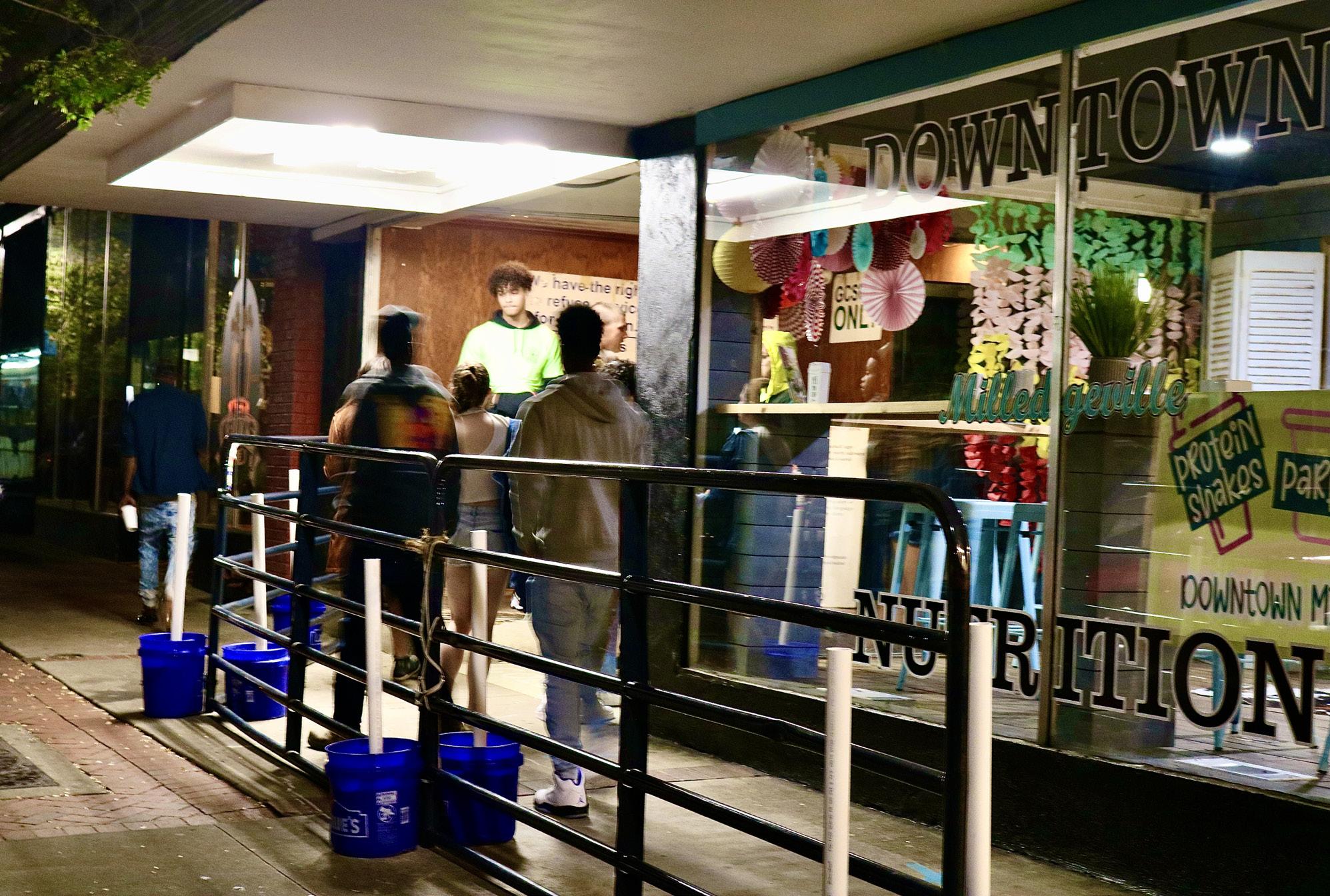
different from the sur rounding community.”
In her opinion, the term “mocal” is not the problem.
“The word itself is fine. It is, colloquially, kind of charming, right? I like ‘small’ for the mall. I think that is awe some. It is a small mall, so we call it the ‘small.’ It is great, right? It fits.”
However, she is con cerned about the term’s use and connotations in day-to-day conversation.


“We rarely hear it
A look into the impact of Hurricane Ian on sports teams at GC. Multiple games were postponed.
used in circumstances where it is not attached to disdain, disrespect, or fear,” McClure said.
“It is not the word itself; it is the connotation around the word, which we read less from what is printed on a page if you say, ‘This is what we call Milledgeville’s locals,’ than what you hear when people use it in conversation.”
On Sept. 25, 1690, the first known print news paper was released to the public in Boston, MA. Printed by Richard Pierce and edited by Ben jamin Harris, the Publick Occurrences was in tended to be released once a month with content that informed Bostonians of events in their city. Only four days after publication, the newspaper was banned by the Governor and Council under claims that Pierce and Harris acted without re gard for authority. The newspaper had an untimely death, but its impression on the public remained.
Following suite of the Publick Occurrences, in 1704 the Boston News-Letter was born. Bookseller and Postmaster, John Campbell, acted as first edi tor and the Boston News-Letter went down in his tory as America’s first continuously-published pa per. According to paperage.com in an article titled, “The First Newspapers in America,” this pamphlet focused on news from London journals and im portant information concerning the European wars.
Citizens now had access to news of their country by simply picking up the most recent edition of the newspaper. It was the Boston News-Letter that led to the chain reaction of the formation of newspaper companies throughout the United States. Since this point in history, Americans have had the privilege to easily access news by way of buying the paper.
Milledgeville is home to many historic homes, but many of these homes are haunted by past residents.
Our generation faces a new problem in the world of dating: how to effectively communicate without the presence of technology.
“Taylor was put in a hotel in Naples, which was not expected to be as impacted by the storm as her home in Fort My ers,” said senior Political Science and Criminal Justice major, Grace Sin gletary. “However, Ian made landfall as a larg er and stronger storm than expected. The first floor of the hotel flood
ed, carrying away their company cars. Taylor was stuck in the hotel for almost two days, I believe. She used social media to share updates with viewers and contin ues to do so, as the com munity is far from back to normal, even more than two weeks later.”
Hurricane Ian caused mass destruction to the lives of people in Cayo Costa, Fort Myers, and Cape Coral, leaving many homes, businesses,
and streets in shambles after the intense storm, which was considered to be one of the most de structive hurricanes in decades. Hurricane Ian left families and commu nities traumatized by the events that took place in its path. Luckily a lot of these families living in af fected areas were able to evacuate in time to brace for the storm, but many families weren’t able to.
“Even though my family was lucky to avoid
the full wrath of Hur ricane Ian, my elderly grandmother and greataunt were still trauma tized by the experience,” Johnston said. “Both of their nursing facilities lost power for two days, requiring them to stay in their temporary evac uation facilities for four days. They were both very uncomfortable in these facilities, squeez ing three patients into a hotel room along with their oxygen machines
 Shadimon Smith Contributing Writer
Shadimon Smith Contributing Writer
GC was established in 1889 as an all-women’s college as the ‘Georgia Normal and Industri al College.’ It was built to provide education in many different ar eas including teaching and business. Some of the smaller classes that were taught were dress making, cooking, and industrial drawing.
The college admin istration for the school learned that more wom en found co-educational schools more appealing after the war started to slow down, and they were finally approved to make the transition, result ing in the name change to Georgia College and State University in 1967.


“GC started as a wom en’s only university, be cause there was no place else for women to get any education beyond 8th grade,” said digital archi vist of special collections at GC, Holly Croft. “They began admitting male students in the spring of 1967. It was a necessary change because society was changing so much.”
There were several other factors that influ enced the decision. With the school losing more enrolling students during this time, becoming coed
was a need for GC to re main open beyond 1996.
“In 1952, there were less than 600 students and GC almost van ished,” said History professor, Robert Wil son III. “Enrollment in creased, but not enough. The board threatened to shut the place down, and the main impulse was declining enrollment.”
Many people did not want to change the school from all-wom en’s to coed. Some felt that it was a necessary change for the school to stay open, while others felt betrayed.
“When it went coed, GC no longer served the whole state of Geor gia. Most of the students came from middle Geor gia, so it basically became a commuter school. In 1967, we became a suit case college,” said Wilson.
The timing of this de cision seems late to some GC students, because the state of Georgia had be come coed decades be fore. At the time, the deci sion to change the school to coed should have been an easier decision.
“I feel like it was a little late, but I think it’s wonderful we did,” said senior Psychology ma jor, Anna Boughton. “As a public institution and I think funding wise, it makes more sense to be open to every
one, not just women.”
Some students be lieve that coeduca tion is the ideal match for GC, because of the goal that GC provides. GC’s goal is to provide an education to all, re gardless of background, gender, and sexuality.
“I think it is wild to think it was an all-wom en’s school at one time,” said junior Psychology major, Katie Whitworth. “I think they try to strive for diversity, too, and I think that coed just makes sense for the vision and background of GC.”
GC is known for its diversification with stu dents coming from all around the world. In the beginning, it was not always inclusive of ev eryone, and many saw this difference with the arrival of the first fe male African American student. Cellestine Hill arrived at GC in 1964 and chose to study psy chology, while work ing hard to clear a path for others like her to be able to get an education.
The change to a coed school, along with allow ing African Americans into the school, allowed the doors to open for an abundance of people. Some students at GC often find themselves thinking that an all-wom en’s school allowed equal opportunities.
“I think it diversi fied the school to some extent,” said senior Ex ercise Science major, Lydia Palmer. “I think it might have been the right choice for GC be cause we were able to put more people in college. Today, I think there are some instances where it
and other medical equip ment. My grandmother was confused about where she was, and she, along with a friend, made a panicked call to my aunt, saying that she had been kidnapped and needed to be rescued. When she returned to her nursing facility, the confusion continued because the facility was still on generator pow er, and her room had no light or air conditioning for the first day home.”
This is the start of a new normal for hurri cane season to come as hurricane season is still on the rise, showing high levels on the Atlantic, which many are saying that climate change may be the cause. Due to the rising temperatures and sea levels, hurricanes are seen to be impacted by these changes, with es timates of more severe weather to come for fu ture hurricane seasons.
is okay for everything to just be for women. To day, it could even be ben eficial for women to have the school to themselves, because we are not grant ed the same opportuni ties in life as men, espe cially women of color.”
GC’s mission was to provide an educational
environment of no dis tractions, equality, and much needed diversi ty. These changes paved the way for GC to be the college it is today, and for the accomplish ments students who have attained a degree here have accomplished.
The
for
for
If you’re interested in writing for The Colonnade, email thegcsucolonnade@gmail.com.
If
email to thegcsucolonnade@ gmail.com.
All stories and
appearing in this
by The Colonnade.
are
The GC late-night bus made its long-awaited return after two years of absence this semester. The shuttle runs from 10:00 PM - 2:45 AM every Thursday, Friday and Saturday with the exception of holidays. It picks students up from West Campus and drops them off at The Max.

The class of 2023,
now in their third year, has never experienced the late-night bus due to its cancellation. Stu dents have relied on walking or the GC Rides GroupMe, created for and by the students, for transportation since their first year at GC.
“It’s nice to see it back now,” said Claire Bousquet, a ju nior nursing major.
“Even though we kind of missed out on it.”
The school ceased operation of the latenight bus as well as the golf cart transpor tation service, SNAP, when the COVID-19 pandemic hit the coun try in March of 2021.
With ridesharing services such as Uber and Lyft nonexistent in Milledgeville, students worried that the ab sence of the late-night bus would put night-go ers in dangerous sce
narios as they attempt ed to find a way home.
Women living in the SLC felt the decision was particularly un fair to them, as living at West Campus year is mandatory for all sopho more sorority members.
Early last school year a Peer Mentor for the SLC launched a petition on the popular cam paign website Change. org titled “Late Night GC Bus”. They urged the
school to reimplement the shuttle, emphasiz ing the safety concerns many students shared. It went on to receive 743 signatures with no re sponse from the school.
In August 2021, af ter a year-long absence from the late-night bus, then-sophomore ex ercise science major Kate McKinley creat ed a GroupMe group chat titled ‘GCSU rides’.
Through GCSU rides, students looking to make some extra cash could offer rides to those look ing for transportation to and from Downtown. Students flocked to join the group chat and within weeks it had over 2,000 members, nearly a third of the GC student population. Rides were in such high demand that some students even began to consider it a job, often making up wards of three hundred dollars in a weekend.
McKinley said she took inspiration from Georgia Southern after noticing they had a group chat dedicated to stu
The importance that GA institutions once held standardized test ing to, seems to be slowly slipping away as GC joins other GA universities along their journey to becoming test optional.
Before this change, GC was among the three GA universities that re quired standardized test scores, a title that was shared with the Univer sity of GA and GA Tech. Now, GC has decided to join the other twenty-six universities and waive the testing option for potential first-year stu dents who have obtained a minimum GPA of 3.2.
Due to low enroll ment this year, waiving standardized testing can attract and encourage more college hopefuls to apply to GC and in turn, GC potentially could be gin to see a peak in en rollment numbers and a rise in the student pop ulation. Going test-op tional can combat the decline in student pop ulation due to retention issues and the current low enrollment numbers.
Mackenzie Pickle, a junior English major, felt that standardized testing is unfair to those
with mental disorders and mental disabilities.
“Standardized test ing is not an accurate
school only set one day a year to take the test.”
Pickle felt happy for upcoming high school
not gone over yet in class then you’re stuffed in a room with proctors and students from oth er schools you haven’t met and they expect you to not get anxious and perform well,” said Por ter. “Imagine how crazy that is. There are other ways to accurately re flect a student’s learning ability or their capacity to retain what they’ve learned in school.”
is rooted in classism and racism,” said Goode. “By making these tests op tional for future students, you are knocking down barriers placed by the historic uplifting of a par ticular race as other races were being torn down and placed into boxes so they couldn’t be success ful. You’re widening the field and giving minori ties a fighting chance.”
dents providing rides to others and felt GC need ed something similar.
“I gathered my friends and added a few people,” said McKinley. “Ev eryone started sending the link around in their sorority and fraternity group chats. The next day it had 800 people.”
However, the creation of the group chat sparked other safety concerns.
Due to GCSU rides being student-operated, their reliability fluctu ated and some students even worried their driv ers may not always be sober as they claim.
“I’ve had rides that have ditched me in the past so I’m wait ing for up to an hour until someone can get me,” said Ella Anchors, sophomore business major. “I would much rather use the late bus because it’s reliable and you know they’re taking you to the right place.”
The group chat re mains active along side the late-night bus, now with close to 3000 members.
other students are in agreeance that stan dardized testing should be done away with.
It appears that GC de ciding to go test-optional may produce the positive results and increase in student admissions the university is hoping for.
reflection of someone’s intelligence due to the fact that some students are naturally not good test takers even if they do not have a history of a mental disorder or disability,” Pickle said.
Pickle expresses the strain she felt when tak ing standardized tests and how the thought of bub bling in a wrong answer could negatively impact all the plans she had laid out for her future stayed in the back of her mind.
“The first time I took the SAT, I got into the testing room and cried because I felt so stressed and overwhelmed,” Pick le said. “Not to mention the lack of testing re sources my school had available for us. We often had to travel further out to testing sites and my
juniors and seniors or those looking to gain en try into a college in gen eral, who no longer had to shoulder the stress of having perfect test scores to get into their dream.
“I’m glad that oth er colleges are realizing that test scores aren’t a good way to measure how smart a person is or the potential they could bring to a school,” said Scarrlee Porter, a senior English major. “They are just unnecessary.”
Porter echoes the same sentiments as Pickle, emphasizing the stress standardized test ing places on sixteen to eighteen-year-olds, while also adding points about the testing conditions.
“Some of the things you see on the SAT and ACT are things you have
Kayla Goode, a senior English major offers a dif ferent view on what going test-optional can mean for future GC students.
“Standardized testing
Many students ex press positive thoughts towards the decision to make standardized tests optional for those students that meet the GPA requirements and
Generational perspec tives and methods to appeal to the upcoming age group tend to vary from generation to gen eration so this could be just the start of a new trend of changes to ad mission requirements to colleges and universities.

-Kayla Goode
By making these tests option al for future students, you are knocking down barriers placed by the historic uplift ing of a particular race.Claire O’Neill | Art Director
A student-created GroupMe has taken over late night transportation for GC students.
The expected heavy rainfall and wind from Hurricane Ian in the southeast resulted in many athletic delays, in cluding for the GC vol leyball and soccer teams.
GC’s volleyball team planned to play a series of games against Flagler College on Sept. 30th and Oct. 1st. Hurri cane Ian’s delays pushed these matches back to Oct. 29th and Oct. 30th.
The soccer team’s homebound conference matchup with USC Aiken was postponed from its originally scheduled date of Oct.1st to Oct. 19th.
GC took precautions regarding the possibility of inclement weather for the safety of all athletes.
Coaches are ensured to stay up to date with
the weather. Postpone ments and cancellations are very likely to be a part of any sports season.
“I don’t expect the delay to change how we play moving forward,” said freshman outside hitter Camryn Carlton. “I do expect it to be chal lenging. We will be play ing four games in a week by the end of the season.”
Volleyball, being an indoor sport, provides more accommodations to continue practic ing and to reschedule games if weather condi tions permit traveling, but with these benefi cial accommodations, also comes the chance of athletes overplaying.
“Makeup games by the end of the season can be extremely chal lenging if we play mul tiple games,” said junior right side Callie Mill
er. “It pushes you as an athlete, but consistency in practices and tourna ments is a key compo nent to make it through situations like that.”
The GC soccer team also continued prac ticing to compensate for the game delays.
While the team was able to reschedule the game against the Pacers, this could potentially af fect the team in weeks to come as they get ready for the postseason.
“The game had to be rescheduled closer to the conference tournament,” said junior defender Grace Phillips. “Now, instead of having a week to prepare for the game, we only have two days.”
The soccer team in tends to continue prac ticing effectively now that they know what is expect ed of them in the near
future of their season.
“Practices have al ready been intensified due to the rescheduling,” said freshman forward Sarah Mason. “We have less time for prepara tion for the conference tournament, but we have to be physically pre pared long before that.”
Due to the extremity of Hurricane Ian’s pro jected destruction, col leges northeast of Flor ida also had a plethora of athletic cancellations
and postponements.
Athletic programs af fected by hurricane Ian include the University of Florida, the University of South Florida, Flori da State University and local universities with in the vicinity of hur ricane Ian’s trajectory.
The Florida Ga tors-Eastern Washington Eagles game scheduled to be in Gainesville, FL was postponed to Sun day, Oct.2nd , and the South Florida Bulls-East
Carolina Pirates game was relocated to the Flor ida Atlantic University field and held on Oct.1st.
Hurricane Ian forced sports teams to make cancellations and post ponements to dozens of events across the Jacksonville location.

Collegiate sports faced many obstacles regarding the reschedul ing of games, resulting in more potential prob lems during the season.
A wild week seven of college football shakes up my top four rankings of who makes the Play off if the season ends today. No. 6 Tennesse took down the always dominate No. 3 Alabama Crimson Tide in Knox ville, Tennessee for the first time in 15 years.
Tennessee slides up past Michigan and takes the third-place spot where Alabama was in my new rankings. The Volunteers proved that they are ready to take their program to that next level and have put together a tremendous season. With domi nant wins over SEC foes and this statement win over the Tide, the Vol
unteers have cement ed their spot in the top four unless they lose.
The Georgia Bulldogs remain at number one.
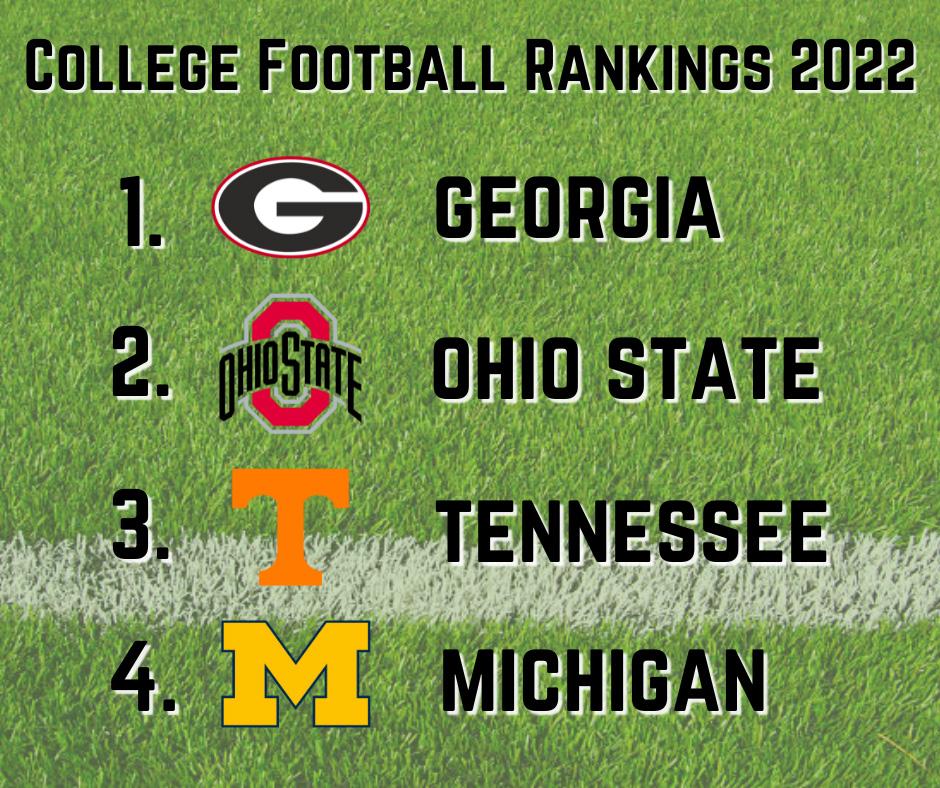
have done nothing to make them drop a spot.
The Bulldogs are coming off a blowout win over SEC opponent Vander bilt 55-0. The Dawgs
Despite two bad games in which they still won, UGA has dominated most of its opponents, and that 49-3 victory over Oregon to start the sea son can’t be overlooked.
I have Ohio State at number two still. The Buckeyes haven’t done anything to drop a spot either. Despite the weak strength of schedule, OSU has repeatedly showed up every week and taken care of busi
ness. Their best win of the season is still No tre Dame, which is why they can’t leap up over Georgia at the moment.
In the fourth spot of my rankings, I have the Michigan Wolver ines once again. The
Wolverines just came off an impressive win over No. 10 Penn State, which they won 41-17. Despite this top ten vic tory, this win over Penn State isn’t as impressive as Tennessee’s win over Alabama. Alabama is a far better opponent than Penn State is right now, therefore, I believe Ten nessee jumps over Mich igan in the rankings. These rankings aren’t set in stone with Geor gia still having to play Tennessee later in the year and Michigan hav ing to play Ohio State to end the season. I have Alabama dropping down to number six and with these match ups still to come, the Tide can find their way back into the top four by the end of the season.
GC soccer came up short in their senior day game versus conference rival North Georgia. The Bobcats lost 3-1 in a game

tion to her having success.

“I think you must have an attacking mind set, especially when we were trailing 2-0, and ul timately just work hard to find a way to create
I think just being more aware of those things going forward and how they really do affect the momentum of the game will be beneficial for my game as well as the team’s
GA’s original capital holds within its streets the history of America as far back as the Revo lutionary War. Milled geville houses several historic sites and land marks, such as the Gov ernor’s Mansion, the former Baldwin County Courthouse, stretches the Trail of Tears, Mem ory Hill cemetery and Central State Hospital.
The buildings of GC’s main campus once act ed as a penitentiary that burned down several times before reconstruc tion for the woman’s college in 1922. Survi vors of Sherman’s March through the south, the homes that surround the campus are some of the oldest build ings in GA’s history.
With all of this his tory, it is no surprise that many people have experienced some ele ments of the supernatu ral here on our campus.
One of the most fa
mous hauntings every freshman learns about when moving into the dorms is the story of ‘Cookie’ in Sanford Hall.
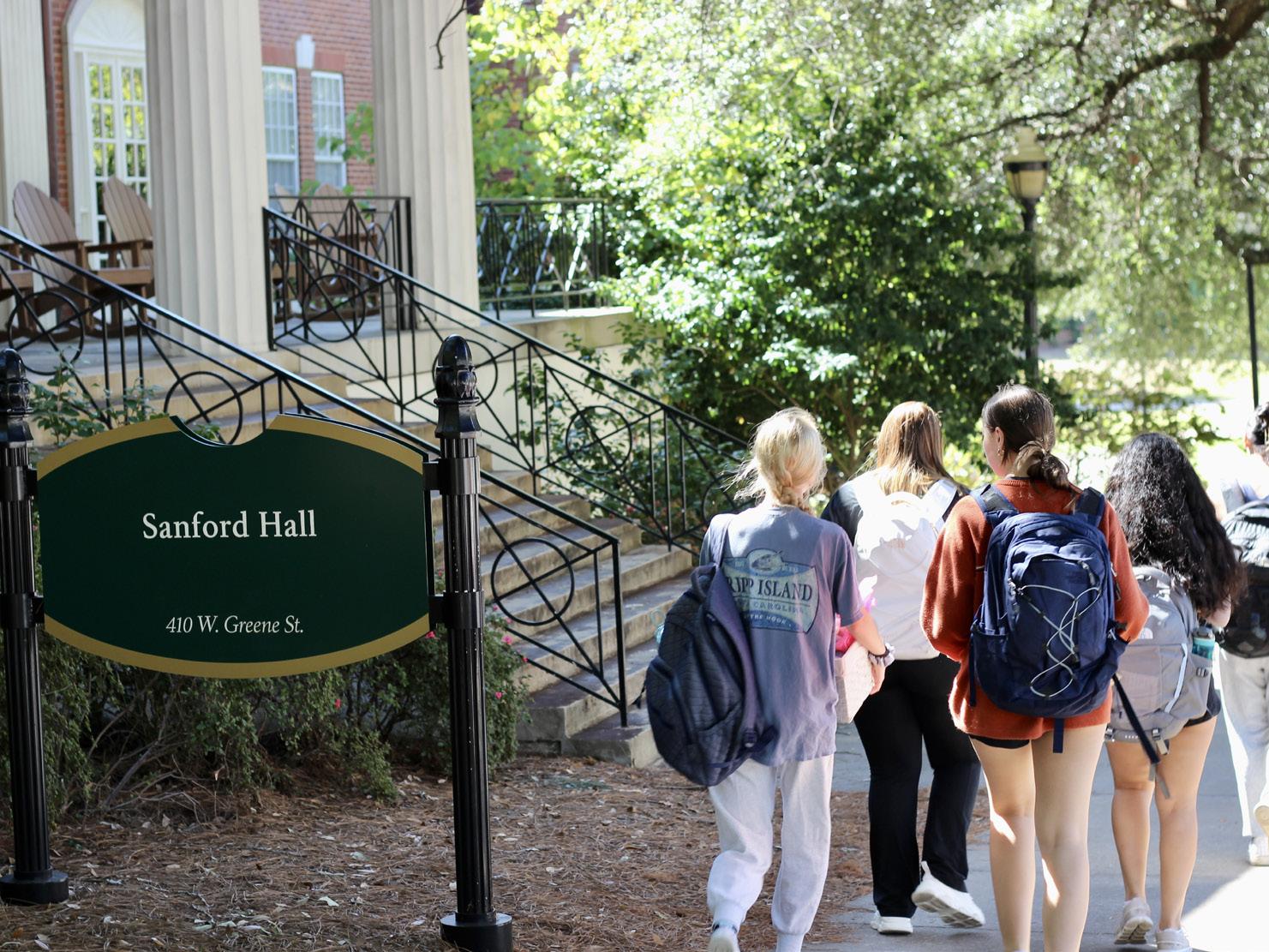
Many years ago, Cookie was a student liv ing in Sanford Hall. She committed suicide in her third-floor room, and she is said to haunt the residents of Sanford. The third floor is now closed to the public and any fu ture residences. However, the rest of the dormitory remains open for new GC students each year.
“There weren’t any specific experiences with the hauntings,” said Kay la Holmes, junior psy chology major. “When I went through recruit ment, only two of us lived there besides the CA’s, and that was crazy. The basement area had such a dark vibe to it and it made a lot of my friends feel anxious; same thing with the hallways. It was weird walking around at night. It felt like you weren’t supposed to be out of your room.”
Holmes’s family has a
unique connection to the dormitory of Stanford Hall, as her Grandmother lived there as well.
“My Grandmother lived in the room where Cookie died,” Holmes said. “She claimed that there wasn’t really any type of hauntings in the traditional sense. It was all just weird feel ings you got in certain parts of the building.”
The pattern of these bad energies and feelings passed through two gen erations in Kayla’s family.
“I don’t know if the bad feelings came from ‘Cookie’ or something else,” Holmes said. “I’m not very superstitious, and I normally don’t re ally believe things about hauntings. However, I don’t know what or how to describe the energy and the vibe in there.”
Another famous building on campus known to History Majors and the Honors College is The Humber- White House. This building is known for its resident that never left, Katy.
“Katy was a little girl, probably eight or nine when she died of tuber culosis that had been spreading through out Milledgeville at the time,” said Claire Rem ley, senior history ma jor. “Katy died in her bedroom which was Dr. Stephen Auerbach’s of fice. Although Dr. Au erbach never heard or saw anything, others had encounters with Katy. Katy was a troublemaker and would enjoy scaring Amy Mimes by setting off the electronic paper towel dispenser. There was also a time where history majors were studying in the house, and they heard scream ing coming from up stairs. The problem was no one was upstairs at the time. The house often had the air conditioning break, causing the house to be uncomfortable, too hot or cold. Yet you couldn’t help but feel a presence in the house. History majors knew not to upset Katy because we didn’t want to upset her.
A little farther down the street off of the main campus residence is the Alpha Gamma Delta house. Many of its residents say they have experienced sev eral hauntings from the previous inhabitants.
“One night, I had just gotten home from work and was sitting in the parking lot when I looked up and saw a tall shadowy figure on the back porch stand ing right by the kitchen door,” said Emma Thub lin, senior psychology major. “I stared at it for a while until it saw me,
and then it just vanished. My room was known to be the most haunt ed room in the house, but besides the tv ran domly turning on in the middle of the night, I had never experienced anything in the room.
Thublins’ roommate also experienced a sim ilar haunting while living in the home.
“My roommate would have things happen to her all the time,” Thub lin said. “She watched her alarm clock slide across her desk and be knocked onto the floor. She also used to hear knocking and tapping footsteps in our room late at night. She would get up to go see what was making the noise, and it would immedi ately stop. She also used to hear heavy breathing at the foot of her bed at night, but only on nights when she was the only person at the house. One night she even heard it right by her ear.”
Before its recon struction into the Alpha Gamma Delta House, it was considered to be one of the oldest houses in Milledgeville. Hold ing its original founda tion and past residents’ history along with it.
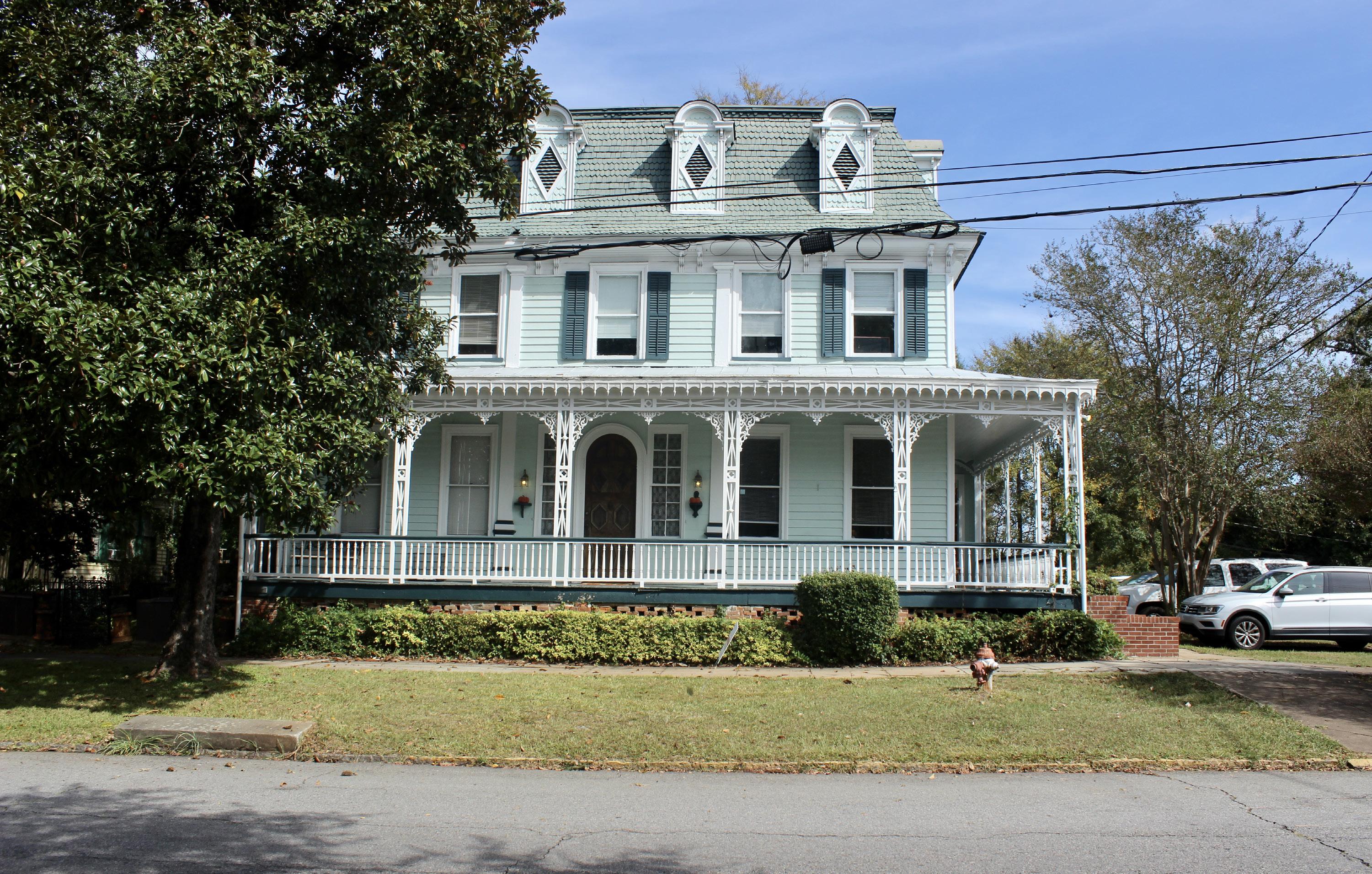
“The house itself used to be a homestead, and I’m pretty sure our basement used to be the living quarters for the enslaved,” Thublin said. “I think it also the peo ple that used to live in the house that haunt it as well because girls see a woman in white in the garden walking around. Once, one of my sisters saw her in the foyer. My
old room also has the most activity because a man jumped out of one of the windows after be ing chained to one of the beds for some sort of illness by the previous residents of the house.”
Even in light of all these hauntings, the girls of Alpha Gam ma Delta have a unique bonding experience as sisters living in the house. They even gave the woman in white the nickname ‘Edith’ which is named after one of their founding members.
These are only a few of the hauntings here in our lovely Milled geville. Some of these haunted places are open to the public every Hal loween. For instance, in past years, Sanford Hall has opened its third hall for a tour if you do nate a canned good.
However, there are other ways to see haunt ed sites here in Milled geville. Every October, the Milledgeville Vis itor Information Cen ter does a special Ghost tour every Saturday at 10 am. Historians take you on a tour through the haunted history and historic sites telling of the spirits that remain.
Memory Hill is also a famous Cemetery here in Milledgeville as a final resting place of many of its residents and history throughout the years and is free to ac cess throughout the day.
These are a few places around campus to be able to see the interesting his tory and haunted loca tion of our college town just in time to get into the spirit of Halloween.
Continued from page 1
As long as one’s in tentions are admira ble, she believes it is possible to use the term appropriately.
“There are better and worse words,” McClure said. “The truth is, most people, as you are in teracting with them, are going to hear your tone and your intent. Their interpretation of your use of a vocabu lary word is going to be shaped by what they understand to be your tone and your intent. People are intelligent.”
The relationship be tween GC students and locals is poor and affects several of downtown Milledgeville’s bars and restaurants. It is com mon for businesses to ask customers for GC IDs because altercations and scuffles between the groups are common.
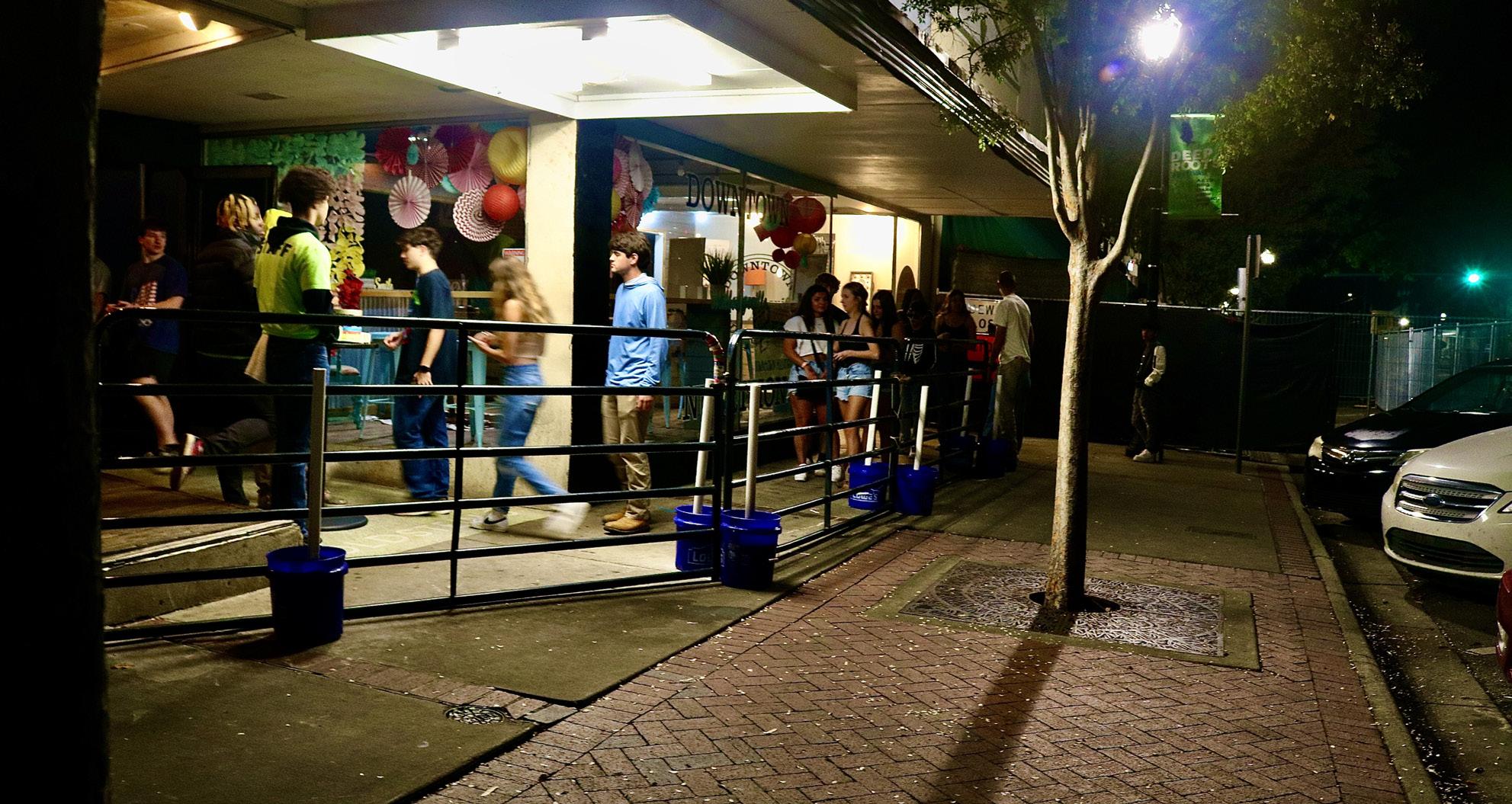
Mattie Thompson, senior art major, is ac customed to downtown
businesses’ ID policies. However, she feels con flicted about the practice.
“I have only had to show my student ID once or twice, but I
Matthew Leverret, junior nursing ma jor, has mixed feelings toward the practice.
“Yes, I have been asked for my school ID,”
Leverett said. “I do not mind it, since it gives me an opportunity to meet new people. I suppose I do not really mind, since it is the owner’s
decision, but it can ruin a local’s night if they do not go to school here.”
He believes both stu dents and locals are re sponsible for repairing
“I think students at tending town events could be a step towards improvement,” Thomp son said. “Milledgeville hosts a ‘First Friday’ festival downtown on the first Friday of ev ery month, and I think that could be a great opportunity for cam pus organizations and students to participate.”
McClure sees pub lic discussion as a crucial step in im proving students’ atti tudes towards locals.
“My solution is edu cation,” McClure said.
have seen this happen frequently downtown,” Thompson said. “I can see both sides to this. I think that it is import ant for college students to feel safe going out, but I also think that it is un fair that locals feel alien ated in their own town.”
the groups’ relationship.
“The relationship can only improve if both sides make an ef fort,” Leverett said.
Thompson views events across Milled geville as opportu nities for students to better the situation.
“That is why I picked this field. Talk about it. Say, ‘Hey, this is a thing that is happening. This is how it is perceived, and these are the consequences.’
Think critically about if you really want to com municate that. It says something about your character, how you see people who you perceive as different from you.”
Braxton Walker, se nior environmental science major, will be graduating from GC in December 2023. While any student graduating from GC is an incredi ble accomplishment and should be celebrated as such, the adversity that Walker faced to get to this point is both remark able and inspirational.
When Walker was just nine years old, he was diagnosed with Langer hans Cell Histiocytosis (LCH), a rare disorder which attacks tissue in every part of the body, and it can cause lesions to form in one or many areas of the body. These lesions, which are areas of the body that under go extensive physio logical change to their structure as a result of damage or injury, cause disruptions in the func tion of any organ in the body. This can at times result in the death of the person diagnosed.
Those who are diag nosed with this disorder have an immune system
that operates in a way that is counteractive to its attempt to maximize the health of a person. Unlike what one would see in someone with a normally functioning immune system, the im mune cells (called his tiocytes) in people with LCH respond to poten tially harmful foreign agents that have managed to enter the body, but they also attack certain parts of one’s own body.
This is detrimental to the body of an afflicted individual, as the body’s most well equipped pro tector essentially tears the body down from its foundation. The destruc tion of the body of a per son diagnosed with LCH can come in a variety of ways including a decline in respiratory function, degradation of liver func tioning and inflamma tion in the bones which can be fatal in children.
Upon his LCH diag nosis, Walker was im mediately transferred to Texas Children’s Hospi tal in Houston, Texas.
Doctors discovered that a large tumor-like le sion had formed on the
front of his spine, very close to his heart. They feared that his life would be in imminent dan ger without aggressive medical intervention.
Walker was hospital ized indefinitely while medical professionals devised a plan of attack for his newly discovered LCH. Things seemed bleak for Walker and his family at the time, and he was unable to participate in physical activity which he felt was an import ant release and coping mechanism for him that he could no longer take advantage of. His parents were uncertain of what their son’s life would be like from this point on, and they spent every mo ment at his side at the hospital, even sleeping there on a tiny couch.
Braxton highlights the integral role his parents had in helping him get through this difficult time in his life, both through their physical presence at his side and the emotion al support they provided.
“They made sure that I was as comfort able as possible and felt loved and supported
throughout the entire process,” Walker said. “Without them, I can only imagine how trau matic the whole experi ence would have been.”
Support for Walker was not just limited to his family. Walker recalls the “garbage bags” full of get well soon cards that came to him while he was hospitalized. He felt extremely encour aged in this difficult time by the response of his family and friends to this unexpected setback.
With an outpour of fortuitous wishes from the community around him, Walker underwent major surgery which in cluded a biopsy where the tumor in his spine was removed along with a dozen lymph nodes that were so swol len they were rough ly the size of grapes.
Upon the successful completion of the sur gery, Walker remained in the hospital for a few more months getting what he called “every check-up in the book” which included blood work, testing, and scans. The results of these
tests were incredible. The tumor was showing no signs of regenera tion, he could go home.
After 4 long months in the hospital, the or deal that Braxton and his family endured was largely over. Today, he enjoys life with no major symptoms or setbacks from LCH except for a higher risk of spinal in jury. However, this does not stop him from pur suing his passions which include skating, surf ing, and wakeboarding.
In retrospect, Walk er views this experience positively, as it has giv en him a perspective on his life that he would not have gained other wise. He says that this experience has escalat ed the level at which he appreciates his life and inspired him to go out of his comfort zone and attempt to experience life in its fullest form.
Part of this remark able change in perspec tive has resulted from a more intimate view of some of the more morbid aspects of life with child hood disease, including the disheartening fact
that many children af flicted by the things are not as lucky as Walker.
“I still remember the worst part of being hospi talized was when I would see other kids who had it way worse than me and likely would not make it,” Walker said. “It gave me a very positive outlook on life, and made me feel like pessimism would be disrespectful to anyone like those kids who do not have anything be sides hope to hold on to. I feel like I have been a much less anxious per son since then, and have learned to take advantage of any new experience that offers itself to me.” Walker looks to take this newfound perspec tive with him to gradua tion next Winter and be yond. He and his friends started a Wakeboarding/ Ski Club at GC, and they want to open their own surf shop in the future. His successful surgery has given him an oppor tunity to display his skills and meet amazing people which he acknowledges would not have been pos sible without the success ful treatment of his LCH.
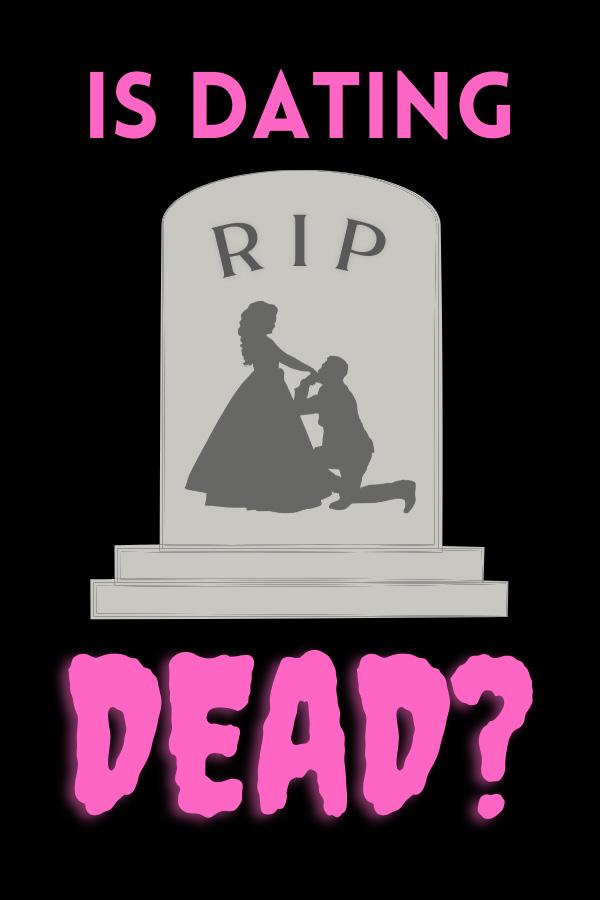 Abigayle Allen Opinion Editor
Abigayle Allen Opinion Editor
The rules of dating are not quite defined, nor have there been exem plary standards set for our generation to base our relationships on.
As for me, I grew up in a household where my parents were high school sweethearts raising me on princess movies and the happily ever after Hallmark Christmas channel movies that we all “love”. Growing up with the impression of love at first sight, love based on the size of your shoe, and true love’s kiss meant that I had unreal istic expectations when I
decided to trade the mov ies out for the real thing.
Growing up with so cial media, I am sure we can all relate that many of our social interrela tions happened behind a little blue screen and when it comes to faceto-face communication, we are all ignorant on how to correctly com municate with each other. Obviously, this sad reality applies to all forms of communica tion, much less commu nicating to find a mate.
With programs like snapchat, match.com, tender, hinge, etc taking over the scene of dat ing, it has allowed for individuals from many
different walks of life to come into contact, but also what kind of con nection exists behind the security blanket of no face-to-face encounters?
As a young wom an, I have had my fair share of scrolling on dating apps, awkward set ups, and failed first date experiences. The one thing that most of these encounters have in common is that nei ther one of us knew how to effectively commu nicate without a phone in between the silence.
While this is not true for everyone, I am sure that the general popu lation can relate to the aspect that dating, as we were taught to know, is few and far between. The loosey-goosey aspect of meeting your true love on a whim or falling in love and marrying your high school sweetheart has nearly gone extinct.
My friends and I in high school would take turns swapping self ies, doing each other’s makeup, and waiting for the special guy to choose us as their date to the prom. Not much has changed since com ing to college, except instead of being a wall
Living in a culture de voted to raising aware ness for diversifying groups, is there a line to the amount of informa tion provided to the gen eral public? The diversi fying group in question comes from the LGBTQ+ new movie film ‘Bros’.
‘Bros’ has been labeled as the first Hollywood studio-backed rom-com featuring two men as the leads. Cowritten and starring Billy Eichner, star comedian and ac tor, this film piggybacks off some of the common rom-com movies giving nods to actors like Meg Ryan with many refer ences. However, compel ling this lead actor exhib its his story, in attempts to highlight the life of a cis gay man, this movie may have gone too far.
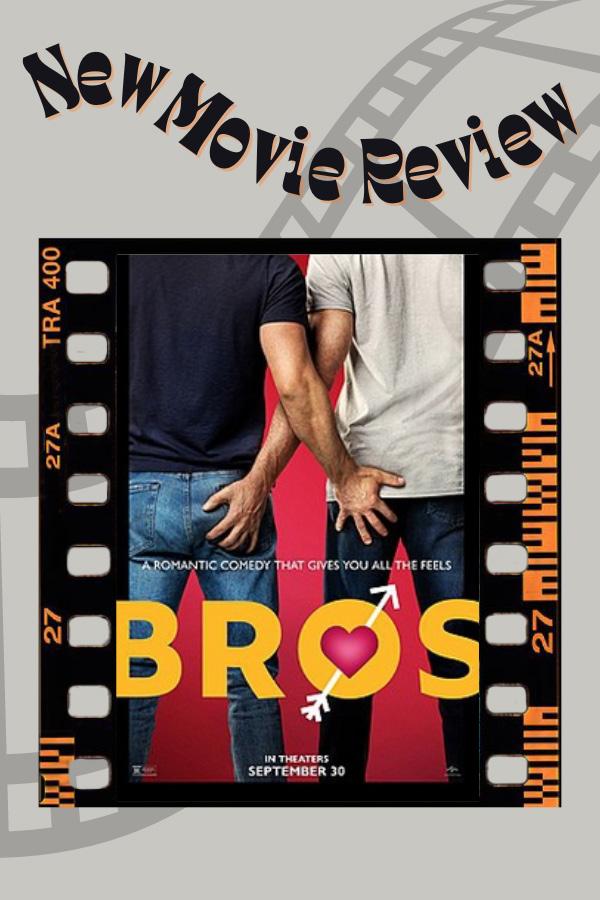
Lead Billy Eichner portrays the life of a gay man who owns his own podcast, 11th Brick, and works as the direc tor for the first national LGBTQ+ history mu seum. Eichner’s char acter touts many times throughout this movie that he believes he is better alone and thrives within the hookup cul ture. However, his plans change when meeting Aaron, Luke Macfarlane (co-lead), as the two be gin navigating their way
through a relationship.
Throughout this film, Eichner uses a dry deliv ery of humor in order to exhibit the most extreme side of dating while be ing a gay man. While this humor, in my opinion, was landing for many au dience members includ ing myself, I think that it would take a knowing perspective to perceive certain scenes correct ly rather than extreme.
In order to state my opinion correctly, it is important that you un derstand the background perspective that allows me a platform to speak my opinion. Visiting my brother, a couple week ends ago, we decided to go to the premiere of the new rom com, ‘Bros’. We both grew up in a “bible-belted” commu nity and because of this, many of our perspectives were laced with knowl edge formed around our upbringing. While this is true, my brother came out as gay during my freshman year of high school and over the past 7 years, he and I have grown in our perspec tives and understandings of what the LGBTQ+ community entails.
While watching this new film, my brother and I found ourselves turn ing away from the screen and he even felt the need to cover my eyes during many of the more explic
it scenes. I understand that as brother and sis ter it could be awkward to watch certain scenes together in the same room, however for a movie that touts itself as a “queer rom-com for straight people” accord ing to The New Yorker, I think that this act alone was telling as to what the directors and writ ers of this movie were trying to tell the public.
I understand that the purpose, or mission if you will, of this movie is meant to complicate people’s understanding of the queer community and portray that relation ships are not perfectly ideal or socially accept able to some. In doing this, director’s casted 2 white cis gay men is a more ideal or acceptable type of relationship when speaking about the queer community. Directors also employed parodying these identities in the be ginning by showing how a person belonging to the LGBTQ+ community may act on a regular basis.
In my humble opinion I think allowing the en tire first half of this mov ie to be based around Eichner, the white cis gay leads, opinion about the entire community does not land well for the general public. I found myself struggling to find the motive or reason for the overabundance
flower at a school dance, we are now wallflowers waiting for some guy to take us home from a bar.
This endless cycle of one-night stands, phys ical connection without emotional connection, and the expectations to withstand another failed “talking” stage has taint ed what was once paint ed as happily ever after to happily forever single.
In attempts to avoid the unattractive “woah is me, I’ll never find the one” mantra that many singles live by nowa days, I guess there has been some good to come out of the world of on line dating. Instead of waiting for the one to find you during some unprecedented time, we now can find a date while sitting on the toi let. But when it comes to matters of the heart, are we really that callus to finding true romance?
In speaking to my el ders; mom, dad, cousins, aunt, uncles, grandpar ents, I have found that many of us are forget ting three vidal steps that could make dating popular again: meet ing prospect partners through relatives; ear ly, upfront communi
cation about goals and life aspirations; and de laying sexual intimacy.
This forces me to ask: is it time to court again? In a more traditional model of dating, finding a match through a rela tive or friend means that at least one other person outside of the hopeful match can see a bright ending. It may ease the difficulties of approach ing a potential partner by having a third party ar range the meeting. Plus, as anyone who’s been ghosted or harassed by a paramour can attest, there’s a benefit to the be havioral accountability a mediated match offers. It is my opinion, that you can’t treat a person met via a setup as “completely disposable” because you have a mutual connec tion it might get back to.
It is true that we, as a generation, may never return to the courtship practices there were of the past, when dating – at least among the American middle class – was highly regimented and scrutinized, nor do I endorse trying. But it may be worth accepting a certain level of restric tion and dependence to get what we ultimately
want while avoiding un necessary pain. It may be worth forgoing the rela tive privacy and autono my of an app to ask our friends for help, worth refraining from acting immediately on our sex ual freedoms in order to give our relationships time to develop, worth losing out on an abun dance of potential op tions in order to narrow the pool to those who might actually want to share a future with us.
Who am I to tell a gen eration how to date and what things we should or should not be doing? No one. But as for me, I think our parents were right in some aspects that dating should be organic and should not be forced upon us from unrealistic standards and the suc cess stories of other peo ple. These are our lives, our relationships – they are ours to choose how to navigate. But maybe, just maybe our “elders” did something right. Maybe just maybe, dating is not dead. And maybe just maybe it’s okay to change the landscape of dat ing the way we know it.
of information shared.
If this movie was try ing to show the most extreme side of the gay, LGBTQ+ community, they hit the hammer on the nail. However, with this overabundance of knowledge have they managed to push the general public, not be longing to the LGBTQ+ community, farther from the truth? Have direc tors managed to ste reotype the entire com munity as extremist or
will the general public understand the humor and enjoy this movie?
As for me, these ques tions have rolled around my mind since first view ing this movie. Because I come from a place of gained perspective and knowledge over the past decade of my life, I know that the entire community does not fit the mold portrayed in this movie. However, for the general public does the community now
face a larger problem?
The purpose of my bringing attention to this subject, really is more to prose questions in hopes for answers. It is my opin ion that every person, re gardless of background, gender, sexuality, cultur al group, etc. has a place in society that should never be fought for. However, I hope that in attempts to raise aware ness, this group has not taken a step backward.
Continued from page 1
As times have changed, so have the methods in which peo ple receive their news. While we once lived in a world where news was printed on paper and de livered to our front door, it is now as easy as an in ternet search. This can be seen in many folds, for some the need for tan gible printed press is no more. But for those that love the craft of jour nalism, it cannot help but be heart wrench ing to watch the down fall of such a legacy. To think that soon enough there may be a point where printed press is virtually nonexistent.
For many newspa per companies, financial struggles and even bank ruptcy have become a tragic reality. In a New York Times article by Ka tie Robertson and Marc Tracy, titled “McClatchy, a Major U.S Newspaper Chain, Files for Bank
ruptcy,” it is revealed the true decline in the interest of printed press.
“The state of the busi ness is dismal. Roughly a quarter of the newspa pers in the United States, most of them weeklies, have been shut down since 2004, and about 50 percent of newspaper jobs have been eliminat ed in that time. Daily weekday print circu lation for newspapers nationwide has plum meted by about 50 mil lion in the last 15 years.”
Print media is a rich experience that has been taken for granted since the early 2000’s and the evolution of digital me dia. Despite living in the age of technological advances, there is some thing grounding and authentic about walking down the street and stop ping to pick up the week ly paper. The ability to physically hold a freshly printed paper hot off the press, to see the pictures, feel the textures and read the words of passionate
writers. When the pa per is gone, we will have only the lights of phone screens to keep ourselves aware of the current times. Being published on the front page of the paper will no longer be a big deal, memorable newspaper clippings will no longer be saved. In a Routledge article titled, “The Future of Journal ism: New Skills, Old Val ues,” it is explored how the legacy of early jour nalism should be pre served in modern-day.
“In this environment, professional journalism risks being traduced, swamped or taken for granted as a source of well-sourced, reliable and well-presented news. It needs to cling to the principles and values of good journalistic prac tice that long predate the digital age, but whose relevance and worth re main undiminished. For all those internet users interested only in rein forcing their own prej udices, there are plenty
of others seeking trust ed guides to lead them through the chaotic in formation overload of the modern age. Journalism needs to offer that guid ance, and to continue to expose wrongdoing and hold power to account.”
As journalists in the modern day, it is an im portant mission to keep alive the foundational aspects that began the craft. While the new times have prompted for a change in how of ten printed editions can
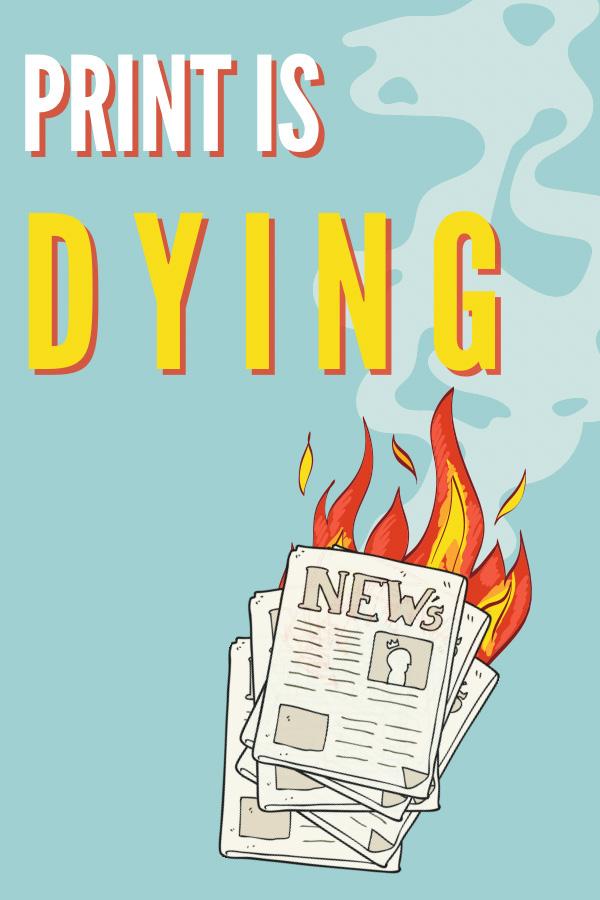
Celebrities in modern day have more societal expectations than before the creation of social media. In today’s world they are expected to be expressive of their beliefs publicly and can even be canceled for failing to comment on certain situations. It can be an overwhelming amount of pressure that has driv en some celebrities to avoid having social me dia all together. It would seem unfair that a person who makes their career in acting or music would be expected to comment on a political situation at all. It seems even more unfair that their career could be jeopardized for keeping their per sonal beliefs private.
I have always been a private person and gen erally keep things to my self or within my circle of friends. This is not for any reason other than just being an aspect of my personality. Me be ing an average person, this is not generally a problem to others. It is inconsequential to most people that I keep my personal opinions of fline. I see no reason that celebrities should be held to a different standard than that. Assumptions about a person’s integri ty based on their lack of posting to social media is not a fair judge of char acter. There is no way to know what that person may be doing behind the scenes to help the
cause in their own way.
As said before, many celebrities have avoid ed having a presence on social media due to the stress of being canceled for this reason. Others allow their management teams to run their ac counts to ensure that this does not happen. In many situations involving can
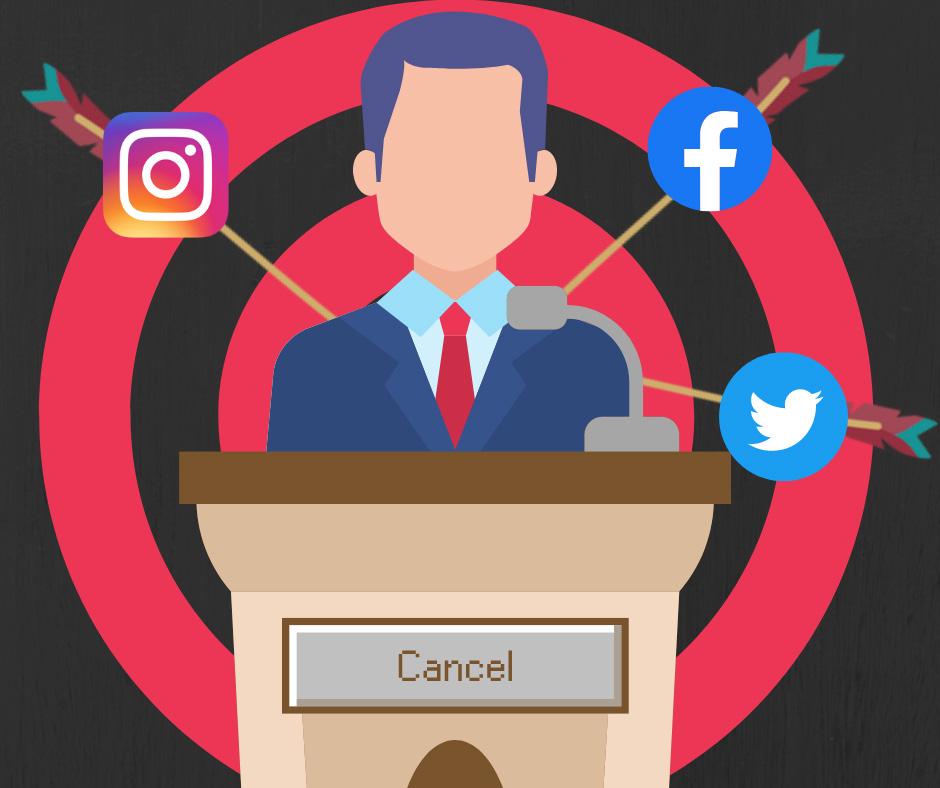
other celebrities do voice their opinions, they also receive flack. Social me dia in most cases is a loselose situation,” Arif said.
“Further, whether ce lebrities choose to speak up because they want to make a difference in the world, or simply because they don’t want to get canceled, is not some
of their career. In a Peo ple Magazine article ti tled, “Celeb Confessions That’ll Make You Never Want to Be Famous,” by Lydia Price, a quote by Amanda Seyfried is cited.
“’It feels like life or death. That’s what a pan ic attack is, really. Your body just goes into fight or flight. The endorphin
mous people acknowl edge having struggled with intense anxiety and depression as well. There are many celebrities that completely avoid having platforms at all. Some of these include Kris ten Stewart, Robert Pat tinson, Daniel Radcliff, Andrew Garfield and Emma Stone. A primary
Claire O’Neill | Art Directorhappen, it is still a shame to be a contributing fac tor in the elimination of printed press alto gether. Doing so shows a disregard of import ant roots that should be held to a higher regard by upcoming journalists.
have ever seen happen. I think when people say things that they feel and mean, and it’s offensive to you, it’s a brilliant op portunity for everyone to learn and grow and un derstand each other. We all come from different ages, different cultures, different backgrounds, different things, and have had different experienc es, different traumas, dif ferent upbringings, dif ferent parents, different religious backgrounds, different everything. Give people an oppor tunity to discuss things before you wipe out their entire person over a statement or a comment or a misunderstanding.”
celed culture, there no longer seems to be a right answer. Even choosing to say nothing at all can result in someone being canceled. In an article within The Gateway, ti tled “Celebrities are free to comment on politics, but at a price,” writer Malaika Arif further ex presses the double stan dards of cancel culture.
“Celebrities who have chosen to remain silent on their political views have received a ton of flack for it, and when
thing we can figure out.”
It is a good point that we no longer can truly seem to tell the authen ticity behind celebri ty posts in many cases. Celebrities now are in a constant state of try ing to escape potential backlash and it is highly likely that in many cases they are only posting to stay in good graces. It is this sort of environment that has caused many celebrities to express the intense anxiety they have faced through the course
rush and the dump that happens after the panic attack is so extraordi nary. You just feel so re lieved, and your body is just kind of recovered in a way. It’s so bizarre be cause it’s physiological, but it starts in your head.’”
These were feelings that Seyfried expressed enduring throughout her journey as an ac tress. Countless celeb rities have indulged in unhealthy coping mech anisms to try and ease the pressures. Many fa
root to this decision is what society has dubbed as cancel culture. A few famous individuals have been bold enough to authentically state their feelings towards being canceled and the un healthy environment it creates. In Movie Guide’s article “10 Surprising Celebs Who Have Re buked Cancel Culture,” written by the Movie Guide Staff, a quote by Sharon Stone is stated.
“I think cancel culture is the stupidest thing I
Personally, I agree with much of what Stone was saying here. In a way, people are too afraid to state their opinions in the world today which ultimately leads to them being afraid to speak at all. That silence caus es a chain reaction of complacency as no one is learning because no one is saying anything. I cannot imagine the stress I would feel if my career and reputation were treated simply be cause I did not post on my social media regard ing a current event. Or for saying something and immediately being violently berated rather than given the chance to even explain. At the end of it all, it feels com pletely unproductive to society’s progression.
